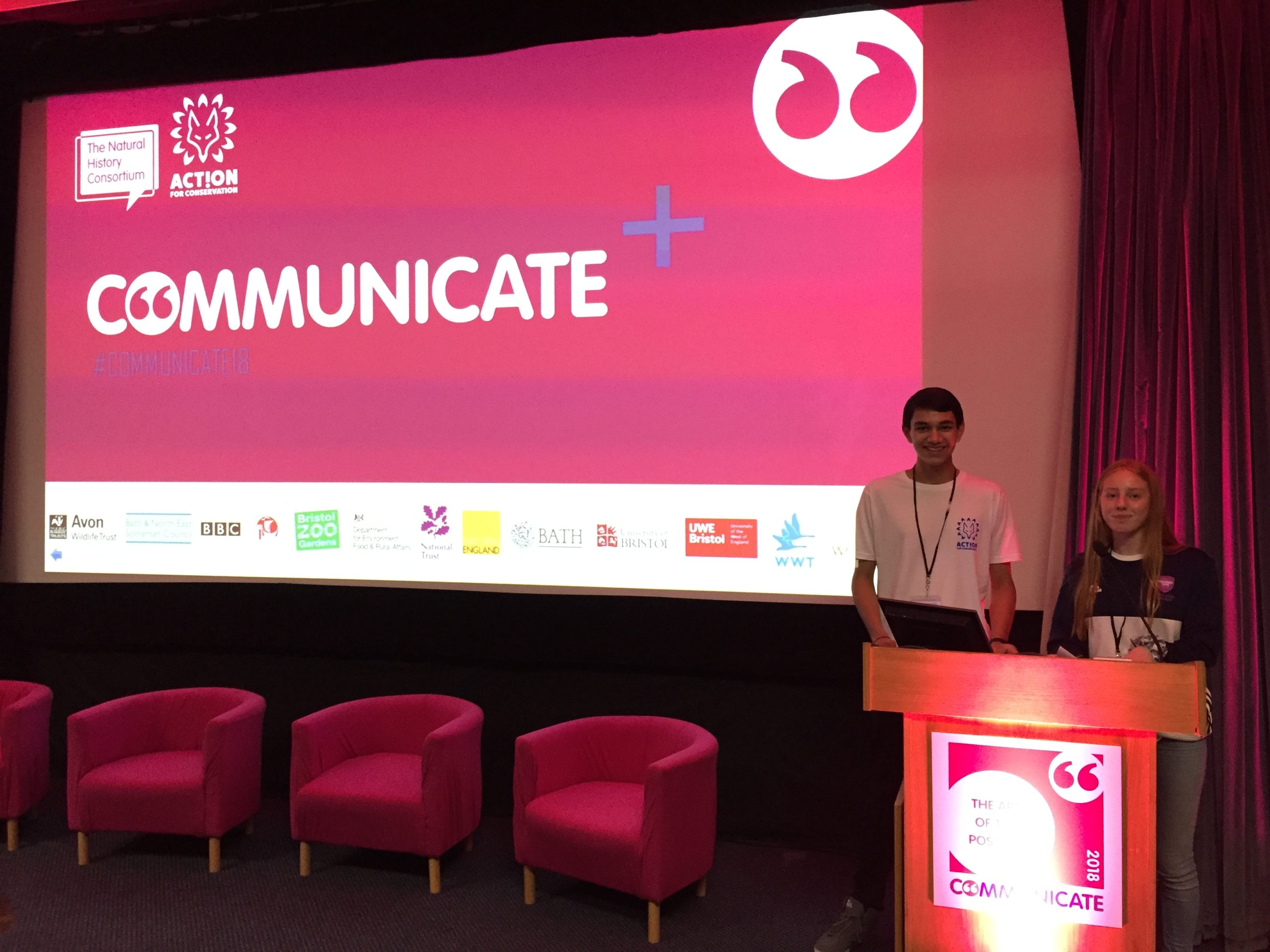Mondays typically aren’t the most exciting of days, but one particular Monday this past October was buzzing with energy as 65 young people filed into the Clifton Pavilion at Bristol Zoo Gardens. It was the very first youth Communicate+ conference and young people from geography and science classes, eco-clubs and youth organisations across the West of England had travelled to be there.
Communicate+, hosted by Action for Conservation and The Natural History Consortium, aimed to bring together young people from diverse backgrounds to discuss how key environmental themes should be communicated over the course of the Government’s 2019 Year of Green Action and galvanise young people to take environmental action in their own lives. With a global decline of 60% in wildlife populations since 1970 and 56% of UK species in decline, it has never been more important to inspire our future conservationists.
Communicate+ gave young people the opportunity to learn from experts and in turn share their own opinions about how the Government and environmental organisations can best engage their generation. Twelve of Action for Conservation’s Youth Ambassadors played a key role in hosting the conference, introducing the sessions and compiling key messages from the evening.
The first session of the conference had a distinct air of anticipation surrounding it. The stage was set with a maroon backdrop and pink uplighting illuminated the Communicate+ logo prominently on the projector screen. As the tech support tested the sound one last time and the speakers took their positions on the stage, the young attendees nervously and silently took their seats. For many of them this was their first time at a professional conference and the first time they had been given the opportunity to share their voice in this way.
The opening talk by Julia Koskella (SYSTEMIQ) engrossed the audience in the challenges and solutions related to Plastics & Fashion, the second focussed on Wildlife Friendly Cities from a local perspective, delivered by Julie Doherty (Avon Wildlife Trust), and the third saw Heather Elgar (West of England Nature Partnership) explore why we Feel Good in Nature. Heather discussed the benefits of nature for our mental health and echoed a wonderful sentiment from Action for Conservation Ambassador Charlie’s poignant introduction. “Nature is a free counselling session where all you have to do is go outside”.
Action for Conservation Ambassador, Josh, particularly enjoyed learning about the plastic and fashion industries and how young people can be part of the solution. “Julia explained that we can take action by raising awareness, putting public and media pressure on companies and taking part in local initiatives like clothing swaps,” Josh said. “This was really inspiring and it reassured me that we can make a difference.”
When the talks ended, hustle and bustle filled the auditorium. Attendees murmured excitedly to each other as they set off to communication training workshops to learn how to craft impactful messages and use their voice. Sessions on Storytelling, Audiences and Framing were led by experts from The Wildfowl & Wetlands Trust, Orangutan Alliance, and Volans.
This training was put to good use in the final ‘Making a Message’ session, where attendees reflected on the types of communications that resonate with them and formed ideas for how Government and environmental organisations can best communicate with young people during the 2019 Year of Green Action.
Three main recommendations for Government and organisations emerged from the discussions:
- Engage new audiences by making environmental action more relevant to young people. Use diverse role models like YouTubers and gamers as a hook and craft clear, solutions-based messaging that appeals to young people with different interests and motivations.
- Encourage more young people to take action for nature in their daily lives by ensuring that opportunities are accessible and relevant to all, social and fun.
“Organisations need to be presenting solutions in the form of simple and easy changes that fit into our everyday lives,” said Josh. “When organisations plan events they should think about the demographics and experiences of the speakers or leaders and do their best to make sure they reflect those of their desired audience.” This is a crucial step in making the environmental sector, which is currently the second least diverse in the UK after farming, employing just 0.06% Visibly Minority Ethnic individuals, more appealing to young people from diverse backgrounds.
3. Educate young people in schools and embed environmental action into the curriculum and Ofsted frameworks.
“All of us agreed that environmental action needs to be part of what we learn at school and normalised from a young age,” said Communicate+ attendee and #iwill ambassador Nayha.
The key message that arose from the conference was that Government and organisations must go beyond simply listening to young people and start making real efforts to appoint them to decision-making positions on steering groups, trustee boards and other leadership bodies.
The recommendations from Communicate+ were presented at the Communicate conference for science communication professionals the following day, by three youth ambassadors from Action for Conservation and the #iwill campaign, alongside a fantastic short film compiled by students from the University of West of England (watch this space for its official release). The presentation was received with interest and excitement and with hopes that the recommendations will be seen by the Secretary of State for Environment, Food and Rural Affairs.
Communicate+ demonstrated that not only do young people care about environmental challenges facing our planet, they are eager and determined to be part of the solution.
****
You can follow updates from Communicate+ using the hashtag #iwill4nature, a hashtag voted for by the young people who attended the conference, and by following Action for Conservation on Twitter and Instagram using the handle @Action4Conserv and on YouTube. Action for Conservation aims to inspire and empower a movement of young people from diverse backgrounds, aged 12-18, to drive change and take action for conservation. You can find out more by visiting their website and signing up to their newsletter here: actionforconservation.org
Hannah Ryan-Leah is a Programme Coordinator at Action for Conservation. She studied Ecological sciences and Conservation management at the University of Edinburgh. She is passionate about working with young people and connecting them to nature, she has a special interest in bat ecology and can often be found leading bat walks on Action for Conservation’s residential camps. She is currently studying an MSc in Science Communication at Imperial College London alongside her role at Action for Conservation.


